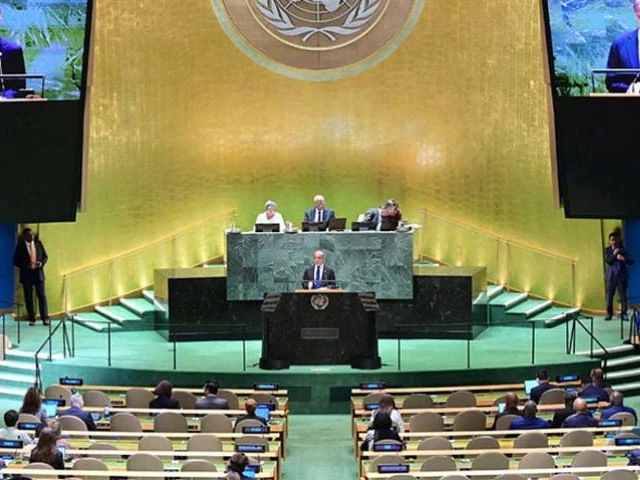World leaders began to come together on Monday for a session of the United Nations General Assembly (Unga) which should be dominated by wars in Gaza and Ukraine, up the Western recognition of the Palestinian State and nuclear tensions with Iran, while the organization marks its 80th anniversary.
“It is an important session that marks the 80th anniversary of the UN,” said Ambassador Asim Iftikhar Ahmad, permanent representative of Pakistan to the UN, adding that the Pakistani delegation, led by Prime Minister Shehbaz Sharif, will play an active role on regional and global issues.
The UN Secretary General, António Guterres, warned: “We meet in turbulent, even unexplored waters”, affirming that international cooperation “was held under invisible pressures in our life”.
More than 150 heads of state or government, as well as dozens of ministers, will participate in the high -level general debate from September 23, when US President Donald Trump is among the first speakers.
Security and Participation
Prime Minister Shehbaz, arriving in New York this afternoon, will be addressed to the 193-members assembly on September 26, his third appearance in front of the body. His speech, according to a declaration from the Ministry of Foreign Affairs, will cover the Gaza crisis, the right to self-determination in Indian, he illegally occupied Jammu-et-Cachemire (IIOJK), climate change and other world concerns.
New York police have implemented massive security measures, deploying thousands of officers and specialized units, including drones, helicopters and port patrols, to protect managers and dignitaries visiting the UN headquarters.
Before the session, the United Kingdom, Canada and Australia officially recognized Palestine’s state, joining an increasing number of Western countries supporting the Palestinian state while the war in Gaza continues.
The role of Pakistan
“Prime Minister’s participation in this greater annual gathering of world leaders will present Pakistan’s strong commitment to multilateralism and the United Nations and to highlight Pakistan’s long -standing contribution to the common peace and development objectives,” the press release added.
Read: PM to join Muslim leaders for joint conferences with Trump
On climate change, the Pakistani leader will present the perspective of Pakistan, stressing the need for urgent global action. It will also address the threat of terrorism and the rising tide of Islamophobia in the world, and highlight the point of view of Pakistan on the achievement of sustainable development objectives aimed at reducing poverty.
Prime Minister Shehbaz will attend several high -level events on the sidelines of the UNGA session, including meetings of the United Nations Security Council, the high -level meeting of the global development initiative and a special high -level event on climate action.
“He will also participate in a meeting of certain Islamic leaders with American President Trump to discuss opinions on regional and international peace and security issues,” the Ministry of Foreign Affairs said.
The Prime Minister will hold bilateral meetings with several world leaders and senior officials of the UN to exchange opinions on key issues. He will underline the determination of Pakistan to work with all the member states of the United Nations to maintain the United Nations Charter, prevent conflicts, promote peace and promote global prosperity in the current role of Pakistan as a member of the Security Council.
Key
On September 22, world leaders will discuss the Beijing + 30 action agenda aimed at making a digital revolution for all women and girls, freedom of poverty, zero violence, complete and equal decision -making power, a word to say in questions of peace and security and climate justice.
Find out more: PM Shehbaz to lead Pakistan to Unga, meet Trump with Islamic leaders
While the world has trouble maintaining the temperature below the international level of 1.5 degrees Celsius above the pre-industrial levels, a summit will take place on September 24 to take stock of the rhythm and the scale of the climate crisis. Managers will present new national climate action plans, known as the national contributions on a national level (NDC), describing measures to combat climate change. The summit will also bring together government, affairs and civil society leaders to stimulate action through attenuation, adaptation, finance and information integrity.
“This is our time of opportunity,” said Guterres, noting that the summit comes before the COP30 Non Climate conference changes in Brazil in November.
The new president of the general assembly, Annalena Baerbock – only the fifth woman of the 80th anniversary of the UN to occupy the post – will chair the debate under the theme: “Better together: 80 years and over for peace, development and human rights.”
In addition, artificial intelligence will also be in good place. World leaders will meet in New York on September 25 to discuss an inclusive and responsible AI governance framework.
Guterres warned that without “adequate railings, AI could further exacerbate inequalities and digital divisions and affects the most vulnerable disproportionately. We must seize this historical opportunity … for the benefit of all humanity. ”
The AI quickly transforms the industries of autonomous cars and medical imaging to the management of inventory, financial trade, virtual assistants and the translation of language in real time. However, its advantages remain unequally distributed and include risks for information accuracy and human rights, including surveillance, without any global organization recognized to govern its expansion.
Last week, the General Assembly adopted by a wide margin of the “New York Declaration”, following a July conference co-organized by France and Saudi Arabia, calling for “just and lasting peace based on international law and on the basis of the two-state solution”.
Read also: France, Summit Saudi host to support the plan to two states like Israel, we boycott
On the Israeli war in Gaza, Prime Minister Shehbaz will call a decisive international action for a cease-fire to end the suffering of the Palestinian people in the besieged enclave.
He urges the international community to resolve “prolonged occupation situations and denial of the right to self-determination”, with a particular accent on the Jammu-et-Cachemire of illegal and Indian occupation (IIOJK).




